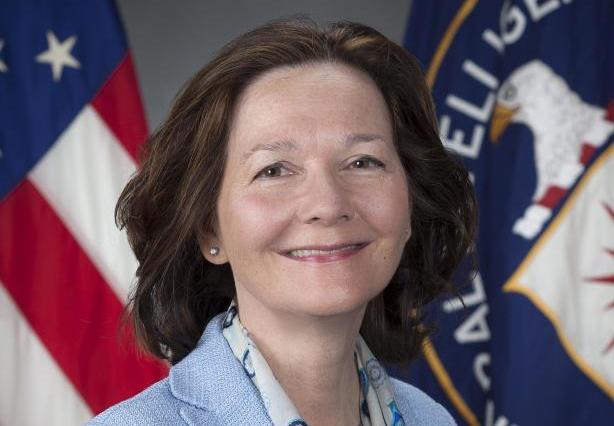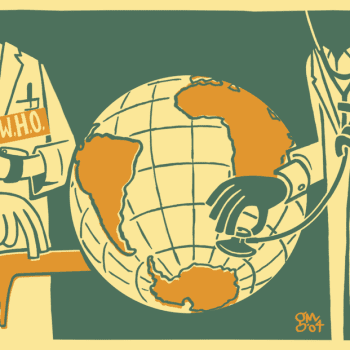Normally, the leadership of important government agencies like the CIA goes to politicians, campaign allies, or career bureaucrats. This spoils system approach is not always bad, resulting in some effective leadership as well as some that is less effective. This time, though, the president has nominated to head the nation’s spy agency an actual spy.
Gina Haspel was not only a long-time CIA employee. She was a clandestine field officer, working undercover in the most dangerous places in the world, having fought in the Cold War against Communism and in the War on Terrorism, rising through the ranks to gain experience at every level of intelligence-gathering and analysis.
The CIA rank-and-file is overjoyed at the prospect of one of their own running the agency. Morale has been low, due to the decades-long politicization of the agency, with its pressure to tell government officials what they want to hear. A Gina Haspel administration could get the agency back on track with the professionalism that used to be its hallmark. She would be only the second operations agent to be promoted to the top spot, and she is being called the most qualified person ever to be nominated for CIA director.
The problem is. . . well, she is a spy. And as such she has had to carry out some unsavory missions. Specifically, she oversaw the interrogation of terrorists in secret locations using water-boarding, later classified as a means of torture.
So a number of senators are opposing her nomination, including not only Democrats but some Republicans such as John McCain and Rand Paul.
So how do we consider this?
First, Marc Thiessen tells of one of her exploits, with others still being classified:
It was one of the Clinton administration’s biggest counterterrorism successes. Just weeks after al-Qaeda terrorists trained by Iran blew up U.S. embassies in Kenya and Tanzania in 1998, Gina Haspel’s phone rang in the middle of the night. She was in her final weeks as station chief in what the CIA describes as an “exotic and tumultuous capital” in central Eurasia, and intelligence had just emerged that two senior al-Qaeda associates linked to the embassy bombings were on their way to the country where she was stationed.
Haspel swung into action, devising an operation to capture the terrorists. She worked around the clock, sleeping on the floor of her office, as agents tracked the terrorists to a local hotel, where the men were apprehended after a firefight. According to the CIA, “The successful operation not only led to the terrorists’ arrest and subsequent imprisonment, but to the seizure of computers that contained details of a terrorist plot.” For her efforts during the operation, which ultimately disrupted a terrorist cell, Haspel in 1999 received the George H.W. Bush Award for Excellence in Counterterrorism . . . .
We should be thrilled that the woman behind this major counterterrorism success has been nominated to become the first female director of the CIA — and only the second person ever to rise to the agency’s top post after spending her entire career in clandestine operations. But instead of being grateful that a seasoned, experienced intelligence operative has been chosen, Senate Democrats are threatening to kill her nomination.
This is insane. Gina Haspel is quite possibly the most qualified person ever nominated to lead the CIA. She has experience in virtually every agency discipline, from counterterrorism to counterintelligence and offensive intelligence operations — including personally recruiting spies and directing covert operations.
Now in those days soon after the 9/11 attacks when the CIA was waterboarding captured terrorists in an effort to identify their comrades and to thwart other plots, water-boarding was not classified as torture and was accepted as a legitimate interrogation technique. Later, authorities determined that it was, in fact, torture and that it may no longer be used.
Lots of CIA, military intelligence, and law enforcement operatives engaged in waterboarding when it was permitted. Should they all be disqualified from promotion or even holding their current positions? Normally, a person isn’t punished for doing something before it was made illegal. So is it fair to punish Agent Haspel now?
Thiessen in the column quoted above points out that John Brennan, who served as CIA director under President Obama, also was involved with these interrogation centers, but Democrats supported him. Why not Haspel? (Brennan had also worked for the CIA and was a presidential Counter Terrorism advisor.)
But let’s look at this controversy from the angle of vocation.
One implication of Luther’s doctrine of vocation is that some actions that are, in general, unlawful, may be lawful when they are authorized by one’s vocation. To take some everyday examples, sex within the vocation of marriage is a good work, though it is sinful outside of that vocation. Punishing someone else’s child is not your job, but if you have the office of a parent, it is.
We are not to kill. Rather, we should love our enemies. In his treatise Whether Soldiers, Too, Can Be Saved, Luther argues that being a soldier is a legitimate calling from God and a means of loving and serving one’s neighbor. He makes the case that a soldier under a Romans 13 chain of command may, “does not bear the sword in vain” (Romans 13:4). That is, the soldier, by virtue of his vocation, may kill his enemy.
This does not exempt the soldier from the moral law binding on all people. As a Christian, he is still enjoined to love his enemies, even though he may have to take their lives in battle, and there are other limits to his conduct and to that of the higher authorities to whom he is subject.
A spy too would seem to be among those who legitimately “bear the sword” under Romans 13.
Espionage involves not only overt actions such as waterboarding, but, even more commonly and essential to the task, deception, lying, pretending to be someone you are not, persuading others to commit acts of betrayal, and other morally-questionable actions.
Can such problematic actions be done under lawful authority and in love and service to one’s neighbor? Put another way, can a Christian be a spy? Must we consider “Whether Spies, Too, Can Be Saved”?
Then again, the only way anyone can be saved is by the forgiveness of sins. In this fallen world, we cannot escape our participation in the network of sin, and we all bear our responsibility for our evil actions. And even when we are forgiven through faith in Christ, He sends us back into the sinful world to love and serve our neighbors, in our vocations. And here we still must struggle, as the conflict between sin and grace continues in both the world we are trying to serve and also within ourselves.
Where should we come down on all of this?
How does this relate to the principle of the Nuremberg Trials that “just following orders” is no defense in the case of heinous crimes ordered by one’s superior? What would be the limits on what a spy–or soldier–should carry out?
If being a spy is intrinsically immoral, should we just not have a Central Intelligence Agency at all? If we do need such a thing, who could work in it without participating in its questionable activities?
Would you vote to confirm Gina Haspel?
Photo, Gina Haspel, by Central Intelligence Agency [Public domain], via Wikimedia Commons


















